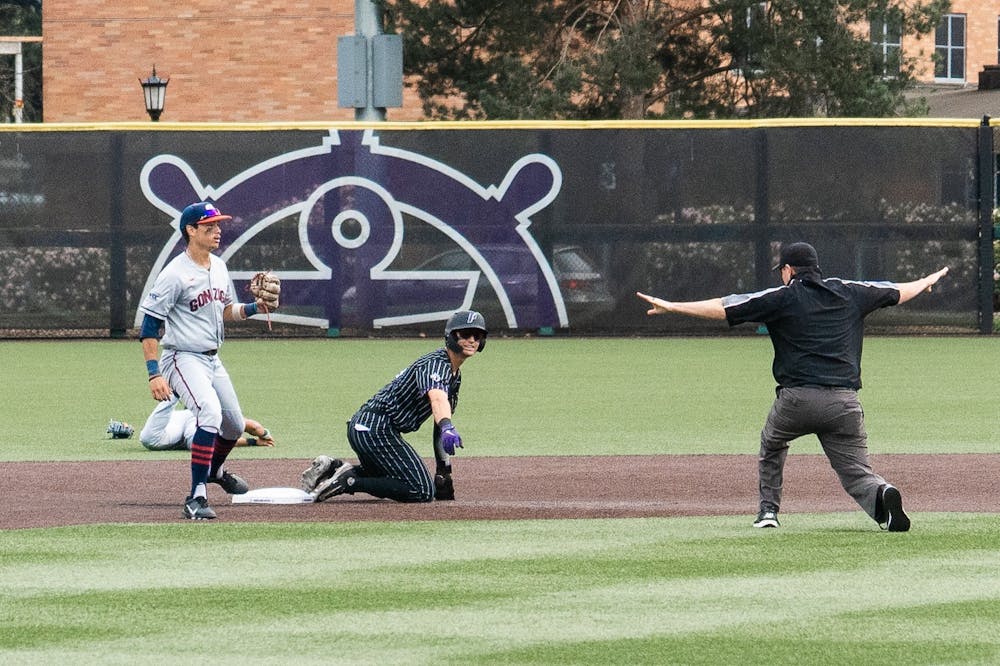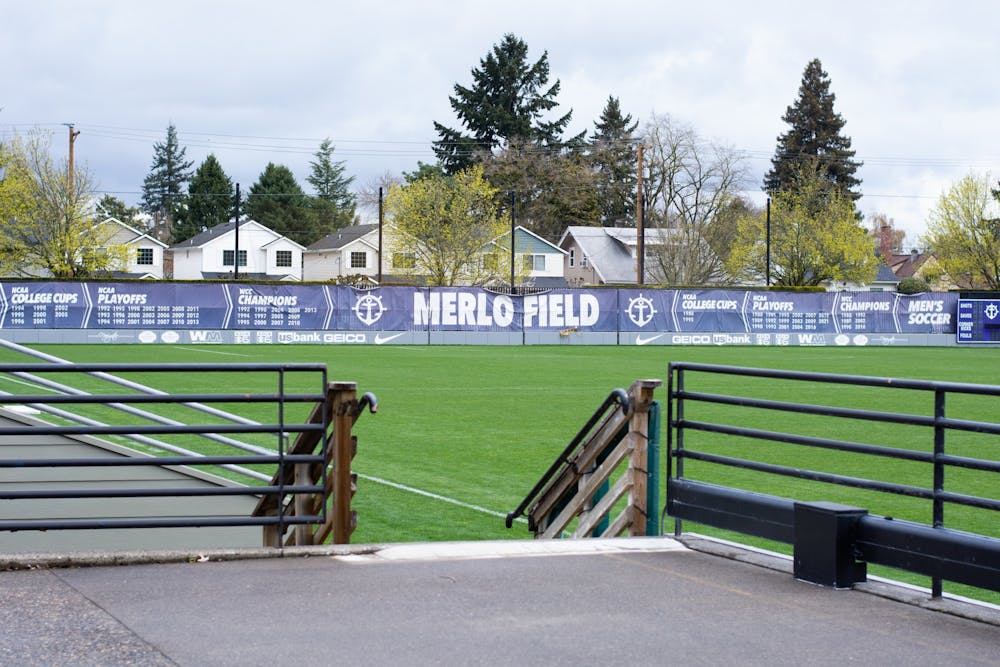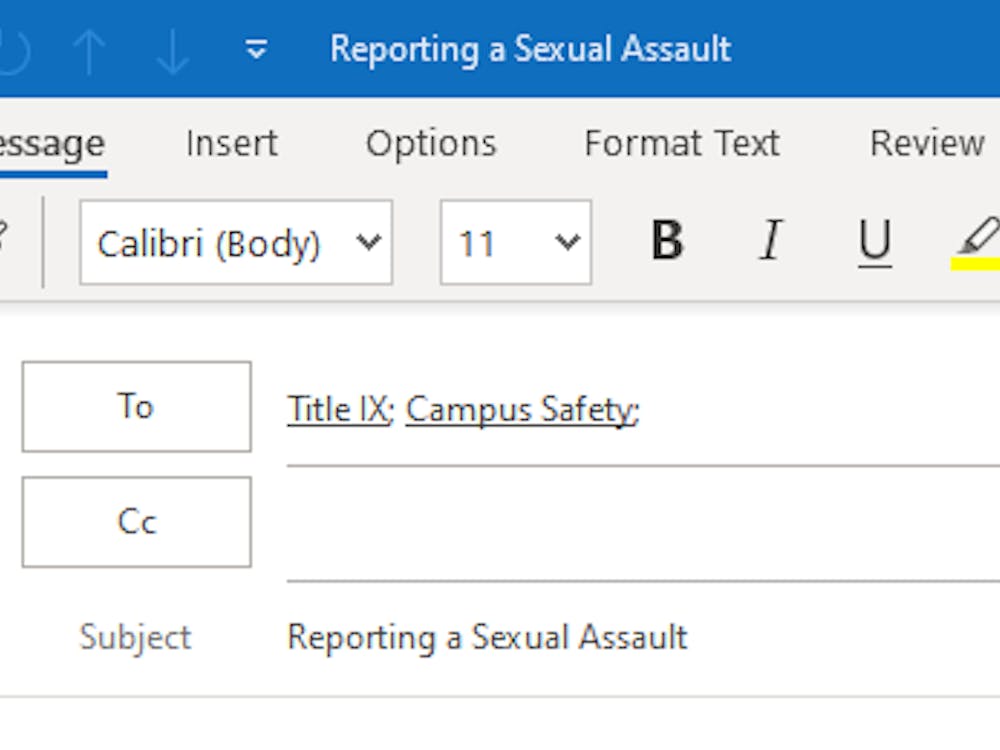If you have been lucky enough to play or watch football on the beautiful grass of Merlo Field, you may have seen the ball skip off the soft, bright green surface of the pitch from a pass. Maybe you have slid or watched a player slide on the freshly mowed grass creating marks and divots and yet the next day the field returns to a perfectly smooth, untouched pitch. Or maybe you’ve walked by as the ground staff mows the field and wondered about what their job entails.
UP participates in several division one (D1) collegiate sports and maintaining the six outdoor athletic fields is paramount to the school's success in sports. There are many grass areas and fields on campus that are maintained by Physical Plant, but in order to keep the athletic fields ready for games UP employs an athletics field manager.
There are currently six athletic fields that require the attention of Graham Harrison, the Interim Athletics Field Manager.
Check off the fields you have been to and try to visit them all, as they are amazing sports fields to play and spectate games on. Of the six fields, three are natural grass — Merlo Field, Franz Varsity Practice Field and Varsity Field — and three that are synthetic turf — Franz Club and Intramural Field, Prusynski Pitch and Joe Etzel Field.
With the help of other ground staff and Physical Plant, Harrison works tirelessly every day to make sure the fields are mowed, clean of debris, and weeded. The natural grass of Merlo Field takes priority, but before the ground staff can even begin working on the fields, the weather is taken into account.
To keep the fields in good condition, field managers have to consider the time of year, the weather for the day, and the rest of the week.
“A lot of what I do is really weather-dependent,” Harrison said.
The weather adds unpredictability to the job making it challenging to keep schedules and plan ahead. Harrison said that while the unpredictability is difficult, it also makes his job fun and exciting since there is no set Monday through Friday schedule.
If the weather allows for work to be done on the fields, the natural grass fields are prioritized over the synthetic turf. The grass fields sometimes require multiple mows a day to keep them at a specific length before games or practices. This is essential because the rain and fertilizer put on the grass can make it grow substantially in the 24 hours after the first mow. The lines of the field are painted on after the field is mowed a second time. Harrison says that they do this before any of the detail work is done on the field.
Detail work includes the smaller-picture jobs that help the grass flourish. The ground staff kneels down with small knives to scratch out weeds in the cement surrounding the fields, they use specific tools to fill in any big divots and they mark and lay down a perimeter for how close to the edge of the field they should mow. On the football fields they count the number of clips that secure the net to the posts to make sure that the net is taut.
The previous Athletics Field Manager made heat lamps, also called grow lights to improve grass growth on thin areas of Merlo Field. They use them to supplement the lack of sunlight and lack of daylight that Portland commonly experiences in the Fall and Spring.
“Nothing compares to natural sunlight, but plants react off of a certain light wavelength, so we replicate that wavelength on our grow lights to simulate the sun,” Harrison said.
Currently, the watering system for the grass fields is turned off, however, when in use, the system is separated into two campuses. River campus which includes the Franz Varsity Practice Fiel, and the upper campus which includes Merlo Field and the Varsity Field.
Right now, the upper campus is run off of city water and river campus is run off of well water. UP is currently working on completing the rest of a well that would be used for water on both campuses. This will cut the cost of water used by UP significantly.

The athletic fields require a lot of attention from the ground staff, but sometimes they get unwanted attention from animal visitors. UP focuses on using environmentally friendly solutions to combat the animals instead of harmful chemicals and pesticides.
“You do what you can for the best interest of the University and for the animals. You don’t want to go and put down these toxic chemicals that could potentially hurt the athletes and the animals.” Harrison said.
One solution the ground staff has used in the past was to sprinkle granulated coyote urine where rabbits, geese, and other animals were eating the grass. Other preventative measures include coyote decoys, reflective tape, and non-toxic EPA-approved granular products.
After the work is done on the natural fields, Harrison turns his attention to the synthetic turf fields.
“They are two different beasts in the same world. They serve almost the same purpose, but how you approach them is completely different.” Harrison said.
The synthetic turf does not need to be mowed, but it does need to be evened out with a black infill made of ground-up car tires. Harrison and his team redistribute the infill across the field and they use a tool to measure the depth of the infill on the field to keep it even.
Harrison says that on the Joe Etzel Baseball Field, they look for wear and tear on the lines, to each base, and rips in the sewing underneath the infill.
The ground staff also sanitizes the synthetic turf fields about once every year. With natural grass, there are good microbes in the grass and soil that naturally fight bacteria, but synthetic turf does not have this natural immune system. The ground staff cleans the turf to prevent bacteria from accumulating. Harrison believes that the maintenance of synthetic turf fields is easier and less involved, but can be more expensive in the long term.
UP boasts numerous sports teams that make news nationally, it’s only fitting that their fields do the same. All the hard work that is put into maintaining the fields really shows, so next time you see someone working on maintaining a field at UP, remember to thank them for all their hard work.
Aidan Hyde is a sports reporter for The Beacon. He can be reached at hydea25@up.edu.








